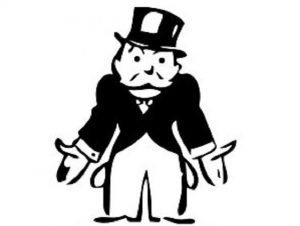The So-Called Lawyer Monopoly
Those who want to say that lawyers have a monopoly should first know how a monopoly operates.
 Whenever there is a discussion on deregulating the legal profession, those favoring deregulation claim that lawyers have a monopoly. This monopoly supposedly makes lawyers prohibitively expensive for most people. Whether lawyers’ fees are too damn high is subjective and will be discussed another time. But today, let’s determine if lawyers are really engaging in monopolistic behavior.
Whenever there is a discussion on deregulating the legal profession, those favoring deregulation claim that lawyers have a monopoly. This monopoly supposedly makes lawyers prohibitively expensive for most people. Whether lawyers’ fees are too damn high is subjective and will be discussed another time. But today, let’s determine if lawyers are really engaging in monopolistic behavior.
A monopoly has only one supplier of a good or service. This allows the supplier to charge the consumer whatever it can get away with. This is obviously not the case in the legal profession. I looked at the number of lawyers in randomly selected states:
Vermont: 3,612
Connecticut: 21,036
Virginia: 24,230
Tennessee: 18,702
New York: 182,296
Kentucky: 13,570
Illinois: 62,720
Indiana: 15,845
North Carolina: 24,253
Pennsylvania: 50,039
Ohio: 38,189

The Business Case For AI At Your Law Firm

I get that not all lawyers are competing against each other. Some are working in government and get their salaries from the taxpayer community chest. Others are working in one of those quirky JD-advantage jobs. Despite that, there is a good chance you’ll find at least three law offices in a boardwalk of any major city. Because of this, fewer attorneys are in general practice in order to avoid competing against each other. Most specialize to differentiate themselves. For example, in my practice area, some specialize in minimizing income taxes, some specialize in estate taxes, and a rare few specialize in avoiding luxury taxes.
Some might argue that lawyers as a group have a monopoly on giving legal advice. Assuming that is the case, the large number of lawyers makes it impossible for them to control prices by operating like a cartel. No state bar or other organization tells lawyers how much to charge a client. In fact, some lawyer message boards and listservs forbid recommending minimum fees or discussing fee structures.
If there is an unspoken minimum floor on legal fees, it is due to the costs of running a law office, not because every lawyer is living on Park Avenue. My criminal defense colleagues tell me there is no free parking when they are just visiting their clients in jail. This is why I am skeptical that legal technicians or paralegals will charge significantly less even though they can take the short line into law practice without the three years of reading and writing in law school.
Another aspect of monopolistic behavior is very high barriers to entry resulting in little to no competition. Electric and water companies are good examples due to the high infrastructure costs to start one and the compliance costs to operate one. In the legal profession, the two significant requirements for entry are getting a law degree and passing the bar exam. Thanks to student loans and businesses like Infilaw, there are pretty much no barriers to getting a law degree (although paying back the loans may be a barrier to a positive net worth). Despite the current criticism about the bar exam, most pass the first time, and almost everyone passes after a few years.
Sponsored

Navigating Financial Success by Avoiding Common Pitfalls and Maximizing Firm Performance

Early Adopters Of Legal AI Gaining Competitive Edge In Marketplace

Is The Future Of Law Distributed? Lessons From The Tech Adoption Curve

Navigating Financial Success by Avoiding Common Pitfalls and Maximizing Firm Performance
The business of law practice does not have the usual negative consumer effects associated with monopolistic behavior. Due to the oversupply of lawyers, no lawyer — either individually or collectively — will reduce output. Also, the consumer has a choice. If someone needs legal advice, they can get one. And most of the time, they can get basic answers through the internet. Some lawyers offer limited scope services or self-help consultations to limit the costs. And for the truly indigent, there is legal aid.
The legal profession does not engage in monopolistic behavior. There are too many competitors, minimal barriers to entry, and as a result, consumers have a choice and so legal fees and service quality must adjust to market forces. So those who want to say that lawyers have a monopoly should first know how a monopoly operates. Otherwise, they should stick to the board game.
Steven Chung is a tax attorney in Los Angeles, California. He helps people with basic tax planning and resolve tax disputes. He is also sympathetic to people with large student loans. He can be reached via email at sachimalbe@excite.com. Or you can connect with him on Twitter (@stevenchung) and connect with him on LinkedIn.
Sponsored

Legal AI: 3 Steps Law Firms Should Take Now








